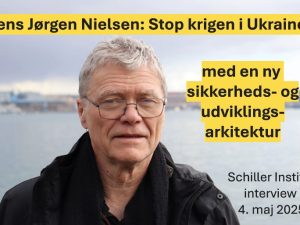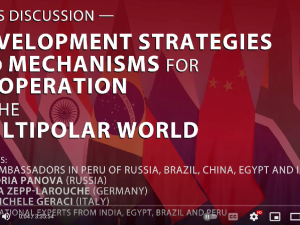
Dec. 7, 2022 (EIRNS)—Vladimir Solovyov aired a 21-minute interview with Helga Zepp-LaRouche on Dec. 7.
VLADIMIR SOLOVYOV: Well, unfortunately, that’s about my German, so if you don’t have anything against it, we’ll try English. I’m sorry for being a late a couple of minutes. You know, those Russians, they’re never good on time. There’s always a problem with Russians being good on time! [laughter]
I have to say: I was quite impressed with your very tough point of view, should I say that? very revolutionary. Definitely not mainstream of current European political ideas. How come? It looks like the Dawn of Europe, the book that was written more than a 100 years ago, suddenly comes true. What are we facing right now? And what should be done, in order to save the world?
HELGA ZEPP-LAROUCHE: Well, I think the problem is that we are, as some of the Russian officials have stated recently, we are already at a state of war between NATO and Russia, and many people in many countries are extremely worried that this may lead to nuclear war. And if it would come to that, I don’t think it would be a limited nuclear war. I think regional war, the use of only tactical nuclear weapons, I think this is all ruled out. And if it comes to the use of only one single nuclear weapon, it would have the danger of a global nuclear and that would mean the annihilation of civilization.
And for me, I think you have to start with that: This is why I have suggested principles, 10 principles for a new international security and development architecture, which is drawing very much on the example of the Peace of Westphalia which ended 150 years of religious war in Europe. And I’m really fighting very hard to put this on the agenda before it is too late.
SOLOVYOV: So what are those 10 principles? And what makes you think that current political power in Germany, but basically in U.S.A.—we realize that; whatever is there right now in Germany, it’s just a reflection, it’s just another projection of American point of view—that they will hear you? That you won’t be punished severely for your point view. Because now it’s not—it’s impossible to talk about the freedom of speech and the freedom of philosophical ideas in Europe.
ZEPP-LAROUCHE: I know it’s not allowed, and you are being ostracized immediately, and worse. But I think we are in a situation—I mean, this is not a tenable situation. Germany, for example, has lost all of its sovereignty with the present government, at least concerning certain ministers. We are running against a collapse in Germany: The economic situation is absolutely devastating. The result of the sanctions, which Germany imposed against Russia, on orders practically of the United States, is boomeranging, and the blowback is threatening the existence of Germany as an industrial nation. So this will become apparent in the next weeks and months.
And I think we are in an epochal change: It’s not just a war between the West and Russia, but the result of the policies imposed against Russia in particular, have led to a counterreaction: The entire Global South is in a revolutionary spirit to establish a just new economic order, and this is a revival of the Non-Aligned Movement, which was already on that course in the 1970s, and now I think it is unstoppable. You have the emergence of a completely new system, which is the BRICS, the SCO (the Shanghai Cooperation Organization), the Eurasian Economic Union, all of these countries are reacting to the policies coming especially from the British and the United States, and they’re forming a new world economic order.
Some people may think it is enough if you have a multipolar world; the unipolar world is definitely over. But I am of the opinion that even multipolarity is not sufficient, because it still has the potential of a geopolitical confrontation. So this is why I think the most advanced proposal to overcome that in the present world comes from President Xi Jinping, who is talking about the “shared community of the future of mankind.” My 10 principles are basically an effort to elaborate principles how we can get people to understand what the new paradigm is, in which we have to move. That is a very deep philosophical conception: I’ve been working together with my late husband, Lyndon LaRouche, on that for the better part of the last 50 years. So I’m convinced that this is resonating with what the world right now urgently needs, which is a new conception—the question, really, is can we as a human civilization give ourselves an order which allows the long-term survivability of our species? So this is the biggest challenge to our intelligence you can have. And since I’m—and that’s the 10th point of my 10 principles—I’m convince that man is fundamentally good, and that the evil in the world is the result of a lack of development.
So I’m confident. I think the danger is incredibly big, but on the same time, I’m also extremely optimistic that a solution to this present calamity can be found.
SOLOVYOV: So what are those 10 principles? What are they? How dare you bring those 10 principles to the world of Schwab! Who is saying that humanity is a disease, and it’s better to be without humanity for the world! So how come that, nowadays, you’re coming with basically, let’s say “humanitarian tradition” of understanding humanity? Instead of modern liberal, Nazi view, where basically humanity should be destroyed?
ZEPP-LAROUCHE: Well, I think the present world order, in large part suffers from the problem of oligarchism: That is not a new phenomenon. You had empires, the Roman Empire, the Byzantine Empire, the Venetian Empire, the British Empire, which in one sense still exists, and these forms of government were based on the idea that you have a small, powerful elite, sometimes the aristocrats, sometimes the financial elite, and that they have all the privileges and rule over backward masses of people. That system is the origin of what a former President of the Czech Republic, Vaclav Klaus, calls the “green delirium,” which is the idea that we are living in a world of finite resources, that you have to have management of scarcity, and all of this.
But that’s not the real universe. The good thing is that man is different from animals, because we are capable of discovering universal principles about the physical universe. This is called scientific and technological progress, and when we apply that progress in the production process, then it leaves to an increase in the living standard, the longevity of people. So, I think we have reached the point now where the evolution of mankind is at a point where we have to adjust the political and economic order to the actual lawfulness of the physical universe, if we want to survive. That is not a new idea: That was actually a philosophical conception in Europe, it was called “natural law.” You have the same idea in other cultures. In India, for example, it’s called “cosmology,” where basically politics is supposed to implement the lawfulness of the cosmos. You have the same idea in Chinese philosophy, with the “Mandate of Heaven.” So in all great cultures, you have the idea that there is a higher lawfulness which we have to respect, or bring about destruction.
So I think we are in a very optimistic change of an epoch. I would call it that mankind is about to reach the age of adulthood.
SOLOVYOV: [laughs] That is very optimistic, should I say! But by reaching the age of adult, we have to face quite new challenges. One of them is that Europe is basically put in an Iron Curtain, by trying to recognize Russia as a “sponsor of terrorism” state, they are just cutting all possible ties that have been left, and it’s leading us to a completely new scenario. Europe without Russia is basically a very small place!
ZEPP-LAROUCHE: Right now, the mainstream media and the major political parties, as they are represented in the European Parliament, which made this resolution about Russian being a terrorist state, that is the surface. And if you only look at the mass media, you get the impression that that is everything there is. But we are organizing people: Look, there are demonstrations in all European countries, to end the war, to have a peaceful negotiation, use diplomacy already, and many people are demonstrating in east Germany, in Belgium, in France, in Italy, even in Great Britain. So I think, this is a very dangerous moment, obviously, but I think that as the crisis will become bigger, and you have hyperinflation, the energy prices, the food prices, I think we are heading towards a very big moment of decision. And what the Schiller Institute is trying to do, is we are organizing international conferences, which have to be virtual because of the still existing pandemic conditions, and we are trying to bring together people from all over the world.
I have initiated something which is called—I should explain—Friedrich Schiller, after whom the Schiller Institute is named, had the idea that there must not be contradiction between patriots and world citizens. So, given the fact that the danger of nuclear war makes everybody, instantly a world citizen, because the whole world is challenged, so I’ve called for a world citizens’ movement. And since I was born in Trier—which some people may recognize the importance of that—I have called for “World Citizens of All Countries, Unite!” [laughs] in which I find a certain irony.
But many people have responded. We’ve had three conferences already with many sitting and former parliamentarians, and former ministers and Presidents from Latin America, who have issued a call to all parliamentarians and elected officials of the world to join this movement, and fight essentially for these 10 principles, and a new security and development architecture.
SOLOVYOV: So you are still an optimist? Do you still think that humanity is going to survive?
ZEPP-LAROUCHE: Oh, yes! You know, obviously, the danger is enormous, because if it comes to nuclear war, there will not be even an historian left to investigate the reasons why it came to this point. So I’m not unaware of the incredible danger. But I believe that the majority of the world is already creating a new system: The BRICS countries already have a GDP which is higher than that of the G7. And you saw at the recent G20 meeting, despite incredible pressure, the majority of the countries of the Global South do not want to change sides! Even the Trilateral Commission, which is really—not exactly my kind of organization—the Japanese representative of the Trilateral Commission just recently said, telling the United States and Great Britain, do not force us to choose sides between China and the United States, because if we are forced, we will choose China. This came from Japanese Trilateral Commission members!
So the spirit is really not—people do not want this geopolitical confrontation any longer. And I think there is a tremendous chance—look, Modi, who will chair the G20 in the coming year, just wrote a very beautiful statement, where he echoed essentially what I’m saying, that there are people who say that man is evil, but he says, no, the fact that there are so many aspirations in religion and philosophy that man is fundamentally good. And I think that with the leadership of India in the G20, you will see that the Global South will have a much great voice.
And we are trying to convince people in the United States and in Europe to join with that new system, rather than trying to oppose it. And, OK, maybe that will not function, but I’m optimistic that it’s the only choice: Because we have to get the United States and Europe to cooperate with the countries of the Global South and China. If the United States and China, which are the two largest economies of the world, are not working together, then no problem of the world can be solved. On the other side, if we succeed in showing that there is an advantage for everybody, to solve poverty—I mean poverty should be eliminated! It is the biggest violation of human rights you can imagine. So, all I want to say, is that what we are proposing is actually in cohesion with the wishes and desires of the world population.
SOLOVYOV: Well! But how can you imagine those guys in U.S., in U.K., in Germany, giving up the complex of superiority, where they still consider the other part of humanity, according to Kipling, half-beast, half-humans, as in the burden of the white man? So how can you imagine Americans suddenly recognizing that they’re not the chosen nation? They won’t count it! They don’t want to do it! No one ever gave up the complex of superiority before being defeated. There is no brain to apply to: Look at Biden! There is no brain to apply to! There is a number of stereotypes! And that’s about it.
ZEPP-LAROUCHE: Yeah, but look, Josep Borrell from the EU made this incredible statement that the EU is a beautiful garden…
SOLOVYOV: Yes, surrounded by jungle.
ZEPP-LAROUCHE: And that made him the laughingstock of the whole world!
SOLOVYOV: But he is an idiot! And he represents the diplomacy of the EU! What kind of idiot right now represents the EU as the top diplomat? That’s annoying!
ZEPP-LAROUCHE: Yes. But, in a certain sense, you have to laugh about it, as many countries of the Global South are doing.
The countries of the developing sector are right now in a mood where they recognize that this is the effort to keep the colonial order. But that is not—Look, all of these countries have a different tradition. The United States, for example, made their independence in the War of Independence against the British Empire. And the Constitution of the United States was the first real republic in the history of mankind, and if you look at the principles of Benjamin Franklin, of George Washington, of John Quincy Adams—John Quincy Adams said exactly what we are saying today, that you need a partnership of perfectly sovereign republics and the United States should not go out and look for foreign monsters. And then, Lincoln had the same idea. Franklin D. Roosevelt, when he designed the Bretton Woods system, it was meant as the first priority to overcome the underdevelopment of the developing countries. Even Kennedy had a beautiful idea about the role of technology would solve all the poverty in the Third World. So there is a tradition in the United States which is completely different. The problem with the United States right now is that they have adopted the model of the British Empire as the basis to rule the world in a unipolar world, in a unipolar style. But that is not the whole United States! The people of the United States are essentially good. It is what some people call the “MICIMATT”—you know, Ray McGovern—
SOLOVYOV: Right.
ZEPP-LAROUCHE: It’s the military-industrial complex, plus the Congress, plus the media, plus Silicon Valley, but that is a small minority. They look like the all-powerful force right now, but I think this other tradition of America is there, and we are trying very hard to make a revival of the best traditions of the United States.
SOLOVYOV: I hope that you succeed. I hope you succeed! Unfortunately, our time is running out. And excuse my smile: The reason is that my wife’s name is Olga Sepp [ph], so when I see Helga Zepp, I feel like I’m talking to a relative, should I say! [laughter]
ZEPP-LAROUCHE: That’s funny!
SOLOVYOV: Yes, that’s quite unusual. And, I love what you’re saying! And I love your very sweet, idealistic, but very thought-through, based on the belief that human are better than they are.
The only minor thing is: The Founding Fathers of the United States, after all about democracy and “human rights,” shall we say, so they all owned slaves. So, their definition of free men, were only for WASPs, and that’s what makes us Russians being so careful when we’re dealing with the West—the definition of every word. You have to be sure that you understand words in the same way. In any other case, we’re running into problems all the time.
It was a pleasure, and I to continue our discussions in the coming future. [hzl]







